Republican environmentalists? There are some — and they’re worth listening to
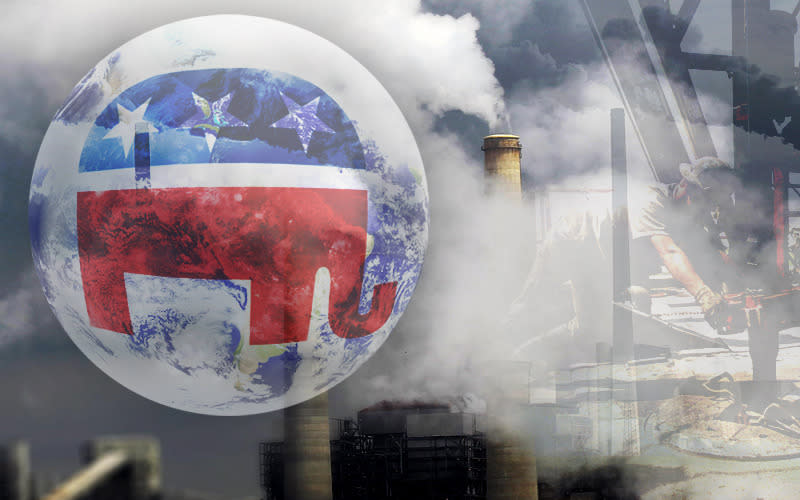
(Photo illustration: Yahoo News, photos: AP)
A recent study found that even among conservative parties in other developed countries, the Republican Party stands alone in doubting the threat, or even the existence, of human-driven climate change.
Sondre Båtstrand, a political scientist at the University of Bergen in Norway, examined the manifestos of conservative parties from nine countries — the United States, the United Kingdom, Norway, Sweden, Spain, Canada, New Zealand, Australia and Germany — and found that the other parties or platforms supported climate measures.
“Even though other conservative parties might share skepticism towards concrete political measures, the Republican Party is the only [one] to openly question climate science and to criticize political opponents for taking climate change seriously,” Båtstrand, whose findings were first published in the Politics and Policy journal on Aug. 12, said in an email to Yahoo News.
Most conservative Republicans doubt or deny the existence of anthropogenic climate change, but there is a movement within the party arguing that conservative values and the power of the free market can ultimately solve the crisis.
“Conservatives are the ones who will deliver the answer to climate change in the dynamism of the free enterprise system,” former Rep. Bob Inglis, R-S.C., said to Yahoo News. “It’s doubly surprising that the free-enterprise party in America isn’t the first one to raise its hand and say, ‘Yes we believe in conservation, and, yes, we believe in the power of free enterprise to solve the problem.’”
At least 97 percent of active climate scientists say that climate-warming trends are the result of human activity.
Gavin Schmidt, a climatologist and the director of the NASA Goddard Institute for Space Studies in New York, explained that scientists know with great confidence that the amount of carbon dioxide in the atmosphere has increased by about 40 percent over the past 150 years.
“It continues to rise at around two [parts per million] a year, and that’s undoubtedly due to the burning of fossil fuels, particularly coal, oil, natural gas, with a contribution from deforestation,” he said in an interview with Yahoo News.
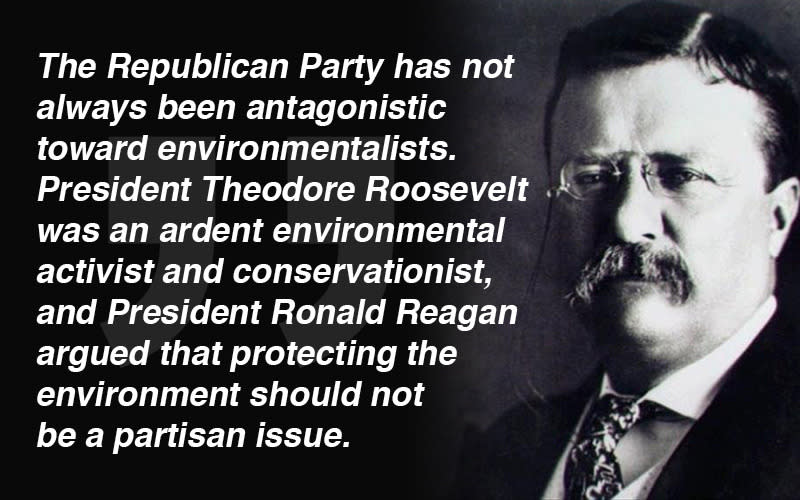
(Photo: Yahoo News/AP)
But nowadays, in the United States, one’s political affiliation is often a better predictor of his or her opinion on this issue than his or her knowledge of science or level of education.
This raises the question: Why is the GOP an anomaly in denying the scientific consensus concerning anthropogenic climate change?
Schmidt was quick to point out that not all Republicans doubt the scientific evidence. Arizona Sen. John McCain comes to mind.
“It’s not that there is something fundamentally anti-science about the Republican Party,” he said. “But there are elements within the party that make people afraid of taking a stand on this issue.”
The anti-science rhetoric of some Republicans, Schmidt suggested, is an example of shooting the messenger when they hear that natural resource exploitation might need to be regulated or curtailed — seemingly at odds with their small-government principles.
“Of course that doesn’t sit well with the huge multibillion-dollar companies that do most of that extraction,” he continued.
Schmidt said that oil and natural gas companies, the Koch brothers and various think tanks successfully planted the seed of an anti-science meme within certain segments of the Republican Party that were already skeptical of information coming from academia or “the coasts.”
Katharine Hayhoe, a professor of atmospheric science at Texas Tech University, experienced this suspicion firsthand when a student in an undergraduate geology course accused her of being a Democrat after she explained the basics of the climate system.
She wrote in the Great Plains journal Prairie Fire that those sorts of incidents compelled her to restructure her class presentations: Now she starts with ice cores, carefully connects the dots between water and carbon and discusses politically neutral solutions.
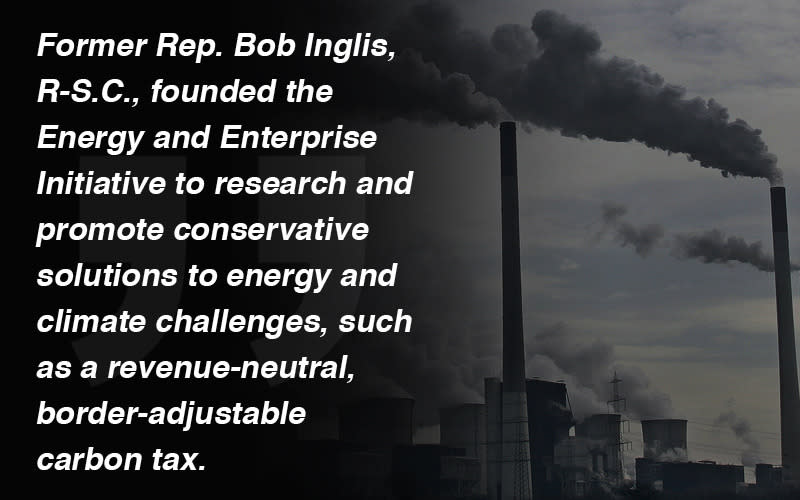
(Photo: Yahoo News/AP)
Distrust of taxes and the government runs deep in our national consciousness, dating back to the American Revolution.
“So is it any surprise that there is such a rancorous, ideological reaction to climate-change solutions that, by definition, require collective action?” Hayhoe asked. “Particularly when that action requires the government to levy a price — or, let’s be blunt, a tax — on carbon, a substance previously perceived to be cost-free for all Americans to produce as they desired?”
At its heart, she said, our inability to recognize and respond to the threat of climate change is a “tragedy of the commons,” in which individuals lack the incentive to limit their own actions for the common good.
Scott Denning, a climate scientist and professor of atmospheric science at Colorado State University, has given climate change presentations to many conservative audiences, including the Heartland Institute, a libertarian think tank that supports climate change denial.
“Frankly, we’ve done a poor job of framing this for those audiences,” he said to Yahoo News. “The three-part message goes as follows: Climate change is happening, it’s human-caused and there’s this huge consensus of scientists.”
According to Denning, this strategy makes some people defensive and all but invites them to disagree with the premise that humans are responsible. Instead, he keeps the focus on the fact that carbon dioxide absorbs heat. As with a pot of water on the stove, “heat in plus heat out equals a change in heat.” Adding heat from the burner with a lid on will result in a change in heat in the water much faster.
“That resonates with people because there’s an obvious cause and effect that they can relate to in their own lives. They respond better to that instead of a kind of a guilt message,” he said.
As it stands, in this country, most of the political solutions offered to combat climate change come from the left. But it does not need to be this way.
There is no reason that the Republican Party cannot acknowledge the science while crafting solutions that align with conservative principles — even leading the charge. It is the party of Theodore Roosevelt, after all.
A belief in sound fiscal policy and small government in no way requires doubting the work of scientists.
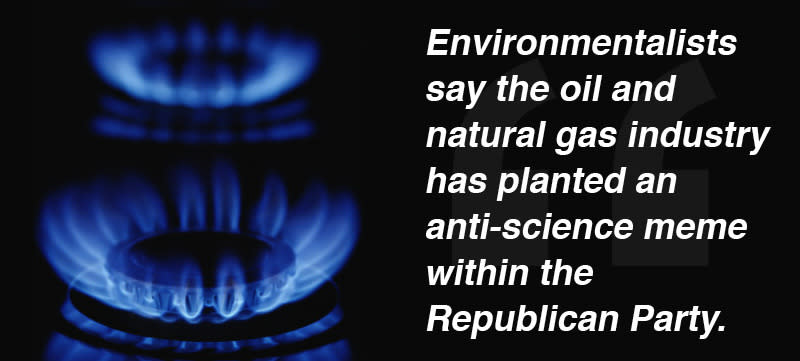
(Photo: Yahoo News/Getty)
“The solutions being tossed around are all from the left,” Denning said. “When I talked to Heartland, I said, ‘You guys are AWOL. Don’t you think that some of the solutions to this problem ought to come from the political right?’”
Conserving the environment is by definition conservative. Incentivizing American entrepreneurship, innovation and free market forces to invigorate the national economy and address the climate crisis is conservative. Putting a price on carbon so that polluters rather than taxpayers take responsibility for their own actions by footing the bill is conservative.
Jerry Taylor, president of the Niskanen Center and former fellow at the Cato Institute, both libertarian think tanks, argues that supporting a carbon tax is a conservative position because the government’s role is to protect the rights to life, liberty, property and the pursuit of happiness.
“If party A is harming the person or property of party B, it is the government’s job to enjoin those rights violations or to somehow make the harmed party whole,” he said to the Nature Conservancy Talk blog. “There is no asterisk in conservative or libertarian ideological doctrines that says ‘unless energy companies are the parties responsible.’ Or, at least, there shouldn’t be.”
There are several conservative groups that believe a healthy environment is compatible with economic prosperity.
In 2012, Inglis founded the Energy and Enterprise Initiative (E&EI) at George Mason University to research and promote conservative solutions to energy and climate challenges. Two years later, E&EI launched RepublicEn, a community of conservatives who describe themselves as “energy optimists and climate realists.”
“They’re energy optimists, confident that market-driven innovation can accelerate an energy revolution,” the group’s website reads. “They’re climate realists, compelled by the evidence that climate risk requires risk management; and they are pumped to learn that they’re not alone.”
E&EI’s preferred policy solution is a revenue-neutral, border-adjustable carbon tax: Revenue-neutral means we need to cut taxes elsewhere; border-adjustable means it will be imposed on imports for countries without a similar tax.
“That’s a way of internalizing the negative externalities,” Inglis said. “If you do that, the free enterprise system can sort this out faster than government regulations or mandates could ever imagine.”
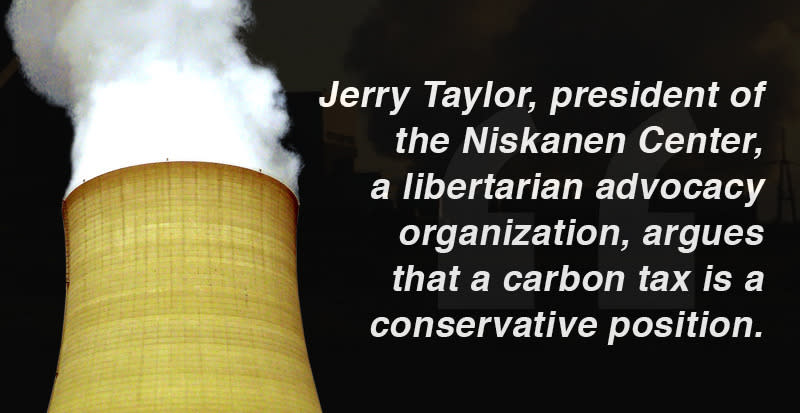
(Photo: Yahoo News/AP)
The conservative position, he said, should include eliminating all the subsidies for oil and gas, no credits for electric cars, no production tax credit for wind, no under-market leases on public land for the extraction of those fossil fuels and no allowing industries to treat the sky as a trash dump without accountability.
Inglis said that people need to stop asking Republicans if they believe in climate change, which could alienate them from their audience, and start asking them if free enterprise can solve climate change.
“That is a question that conservatives can answer in the affirmative in front of the reddest-meat crowd,” he said. “Conservatives, we believe that free enterprise can solve problems you don’t even have.”
Similarly, ConservAmerica, which was founded in 1995 under the name Republicans for Environmental Protection, argues that it is a “persistent myth” that environmental protection is a liberal cause. The group thinks establishment Republicans have lost sight that it is a core conservative value. There are even, counter-intuitively, green members of the tea party, such as Debbie Dooley, president of the Green Tea Coalition and founder of Conservatives for Energy Freedom.
Liberal and conservative politicians can reasonably debate the proper response to climate change while sharing basic scientific principles.
As the climate crisis deepens, the voices of conservatives concerned with the environment should only grow louder. But they are not lighting out for uncharted territory.
The onetime senator and Republican presidential candidate Barry Goldwater, “Mr. Conservative,” once wrote, “While I am a great believer in the free enterprise system and all that it entails, I am an even stronger believer in the right of our people to live in a clean and pollution-free environment.”
None other than former President Ronald Reagan, the steward of the 1980s’ free-market revolution and a hero to the Republican Party, said that protecting the environment should not be a partisan issue.
“If we’ve learned any lessons during the past few decades, perhaps the most important is that preservation of our environment is not a partisan challenge; it’s common sense,” the Great Communicator said while signing the annual report of Council on Environmental Quality in July 1984. “Our physical health, our social happiness and our economic well-being will be sustained only by all of us working in partnership as thoughtful, effective stewards of our natural resources.”


